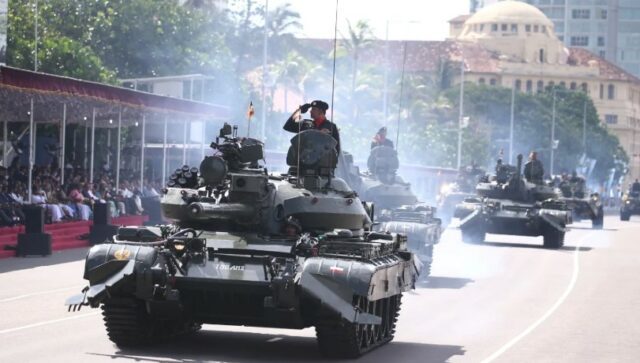As Sri Lanka celebrates 75 years of independence with military pomp and pageantry amidst the worst economic crisis in the island’s history, the proposed defence reforms by the government are making slow progress, with stakeholder consultations ongoing.
The Sunday Morning learns that about a dozen line ministries have been consulted in the latest attempt to restructure Sri Lanka’s national security architecture.
However, a timeline for the completion of the ‘Defence 2030’ review remains elusive, with both the Ministry of Defence (MoD) and the office of the State Minister for Defence not responding to inquiries.
It is understood that the MoD has appointed a board to review the initial drafts of the ‘National Security Policy’ and ‘National Defence Policy,’ which were produced in 2016, and update them.
According to NDC Commandant Major General Amal Karunasekara, the MoD-appointed board, which he is a part of, has been tasked with formulating a robust and viable National Security Policy as part of the ‘Defence 2030’ review.
Early Attempts
According to a retired defence official who spoke to The Sunday Morning on terms of anonymity, over the last few decades, there have been several studies carried out by individuals and committees on Sri Lanka’s national security concerns with the aim of producing a holistic policy document.
According to the official, in the early 1990s, a leading diplomat had formulated a basic National Security Policy framework, which was not taken up by the then administration.
These efforts have often been interrupted with the transformation of various governments and encompassing administrations and their respective policies which led to inconsistency. It is understood that in 2016, under the patronage of the MoD, a National Security Policy and National Defence Policy was drafted.
However, it was later identified that both draft policies had not included broad consultations when being drafted and were subsequently shelved. The Ministry of Defence had sought assistance from several foreign countries to help in formulating a template to assess national security goals during the period, it is learnt.
According to the official, another draft National Security Policy had been prepared to be approved by the Cabinet of Ministers, but that attempt too had failed to receive approval.
‘Defence 2030’ Process
Responding to a question regarding the ‘Defence 2030’ review, Maj. Gen. Karunasekara said: “Presently, a board has been appointed by the Ministry of Defence to review the initial draft of the National Security Policy and the National Defence Policy, which was produced in 2016 and carry out necessary updates and formulate a proper and viable National Security Policy for the country. The board has conducted a detailed review of the draft National Security Policy and conducted several rounds of ministerial consultations covering most of the ministries and obtained their insights for the new NSP.”
According to Karunasekara, internationally, nation states conduct defence reviews periodically, with many opting to do so every five years and some opting for 10-year reviews. Such reviews lead to policy documents such as defence white papers, which are often accessible to the public and other countries.
“For example, it is vital to understand our national values, national interests and national security objectives according to the national vision of the country. For that, a comprehensive study has to be carried out to identify our strengths, opportunities, threats, and vulnerabilities first. The present committee has almost completed these steps and outputs will be shared with other stakeholders for their comments and inputs and thereafter necessary modifications will be carried out,” Maj. Gen. Karunasekara said, adding that the current review undertaken by the MoD-appointed board had also used a standard framework which many other countries used for the task.
Key National Security Goals
When asked what national security goals would frame the NSP which the ‘Defence 2030’ review planned to draft, Karunasekara said that the following areas had been identified as of now, with the list evolving as stakeholder consultations evolved.
They are: upholding the Constitution, protecting and preserving territorial integrity and sovereignty, protecting lines of communication, pursuit of sustaining economic growth and prosperity, strengthening partnerships/relations for regional and international security and stability, upholding democratic institutions and advancement of good governance, preserving national values, ensuring public safety and crisis response, protecting, managing, preservation, and development of natural and physical environment and national heritage sites, prevention of negative domestic developments and events that could affect communal harmony and co-existence of diverse groups in Sri Lanka, and strength of the armed forces and ‘right-sizing’ them.
According to Karunasekara, as a National Security Policy has not yet been finalised, key defence goals or targets have not been identified yet and therefore it is not possible to comment on a future defence forces structure.
“However, it is evident that a strong defence is necessary to deter, deny, and defeat any form of aggression and crisis that threatens our survival. Thus, the existence of credible, sustainable, and adaptable armed forces is inalienable with the aspirations of national prosperity, regional peace, stability, and collaborative security,” the NDC Commandant opined.
Responding to a question regarding security and defence goals envisaged for 2030, Karunasekara said: “Being an island, Sri Lanka needs to enhance the strategic depth for credible defence against possible external aggression. Though the possibility of any external aggression towards Sri Lanka is remote, neglecting the risk of such can be catastrophic.
“Core to Sri Lanka’s defence policy is non-aggression and self-preservation. Thus, fundamental to preserving our sovereignty and territorial integrity is developing our capacity for cohesive defence and credible deterrence along with assertive diplomacy. Hence, cohesive defence, credible deterrence, and assertive diplomacy are to be regarded as pillars of our defence policy which underscore the core of non-aggression.”
Should Not Be An Act Of Desperation
Defence reforms have been long overdue in the Sri Lankan context. With the armed conflict coming to an end in 2009, the large size of the armed forces raised by the State for wartime demands remained unaltered over the last decade. This, consumed a large part of the national expenditure, a luxury Sri Lanka cannot afford to sustain given the status of its economy.
However, recalibrating Sri Lanka’s National Security Policy and defence posture should not be done haphazardly.
“The resizing of the military and the security structure of Sri Lanka should not be done in an ad hoc manner; it should not be an act of desperation aimed at expenditure reduction alone. National security is a wide umbrella and needs to be framed well after a good analysis. National goals need to be first formulated and there should be broad consensus on what Sri Lanka wants to be and how we want to get there,” the retired defence official opined.
“The need to reduce defence expenditure is clear. Yes, it should be done. However, the way we do it should be well planned. If you move to shed thousands of young men trained in the art of war, with only a combat-oriented skill set to fend for themselves, they are at risk of being exploited by organised crime and other disruptors. We need to ask the question: have we equipped them to find employment? How will they support themselves and what social issues will such a flood cause? We need to have a plan and follow it,” the defence official said.
(By arrangement with ‘The Sunday Morning’)
















